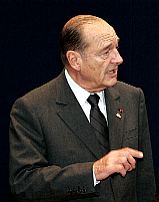 President Chirac accused Israel today of wanting to "destroy Lebanon" as the United Nations sent a team of senior diplomats to the region to tackle the crisis caused by Hezbollah’s abduction of two Israeli soldiers.
President Chirac accused Israel today of wanting to "destroy Lebanon" as the United Nations sent a team of senior diplomats to the region to tackle the crisis caused by Hezbollah’s abduction of two Israeli soldiers.
So far Israel has ignored international concerns about its widespread military offensive in Lebanon and also escaped a UN Security Council motion calling for it to halt its operations in Gaza last night when a draft resolution was vetoed as "unbalanced" by the United States. Israel stepped up its actions in Lebanon today, hitting roads, bridges, fuel supplies and once again attacking Beirut airport to enforce a blockade of the country. Around 60 Lebanese have been killed since the violence flared on Wednesday after a cross-border raid by Hezbollah in which the two soldiers were captured.
M Chirac used his traditional Bastille Day live television interview to criticise the Israeli offensive. "One may well ask if there isn
"I find honestly – as all Europeans do – that the current reactions are totally disproportionate. In the Middle East we are currently in a situation of great fragility and instability. We are in a dangerous situation, a very dangerous situation. We must be very, very careful."
As the former administrative power in Lebanon and Syria – both of which it governed under League of Nations mandate between the two world wars – France has close political and cultural links with the region.
The scale of the Israeli offensive has put the United States in a difficult position, having to back its closest ally’s right to self-defence while at the same time trying to limit the damage to the government of Fouad Siniora, the first Lebanese Prime Minister since Syrian forces left the country last year.
Mr Siniora’s office announced that the Prime Minister received a call from Mr Bush today, in which he was given reassurances that Washington would press Israel to limit civilian casualties.
"Prime Minister Siniora called on President Bush to exert all his efforts on Israel to stop its aggression on Lebanon, reach a comprehensive ceasefire and lift its blockade," it said in a statement.
"President Bush stressed that he was keen on pressing Israel to contain the damage to Lebanon and to avoid inflicting harm on innocent civilians."
Mr Bush flew into Russia today for a summit of G8 leaders where the spiralling Middle East crisis is expected to dominate discussions this weekend.
The US leader was to meet his host, President Putin, for face-to-face talks ahead of the summit in St Petersburg and Mr Putin – who has also criticised the Israeli offensive as disproportionate – said those talks would focus on the conflict in Lebanon.
The crisis was also discussed in Downing Street, where Tony Blair met the Stephen Harper, the Canadian Prime Minister.
"I want to emphasise just how serious I think this is," Mr Blair told reporters after the meeting. "I entirely understand the desire, and indeed need, for Israel to defend itself properly, and I also understand the plight of Lebanon and the Lebanese Government, not to say the many Palestinians that suffer as well.
Mr Blair said that he believed that, as soon as possible, negotiations between Israeli and Palestinian authorities must "get back on the road map toward a two-state solution, as it offers the only chance for stability and peace in the future".
The Security Council is to hold a special meeting later today to discuss Lebanon’s request that it "adopt a complete and immediate position for a ceasefire" after the Israeli air strikes.
Kofi Annan, the UN Secretary-General, is sending a three-man crisis team, led by his special political adviser, Vijay Nambiar, to try to defuse the situation. Speaking to reporters in Rome, Mr Annan said today that he was "profoundly worried" by the increase in violence and condemned any attacks on civilians.
Mr Nambiar’s team will spend a week in the region, beginning in Cairo, where they will meet Egyptian officials and Arab League foreign ministers. They are then expected to travel to Israel, the Palestinian territories, Lebanon and Syria.
In a Security Council meeting yesterday, ten of the 15 Council members supported a draft resolution calling on Israel to halt its military operations in Gaza, where 86 people have been killed since Islamic militants seized a young Israeli corporal in a cross-border raid on June 25. Four, including Britain, abstained, while the United States voted against.
The vetoed resolution had condemned Israel’s retaliatory assault and called for an end to military operations and the immediate withdrawal of Israeli troops. It also condemned the firing of rockets from Gaza into Israel and Shalit’s abduction.
The United States, Israel’s staunchest ally, last used its veto in the Security Council in October 2004, to block a similar draft demanding that Israel end military operations in northern Gaza and withdraw from the area.



